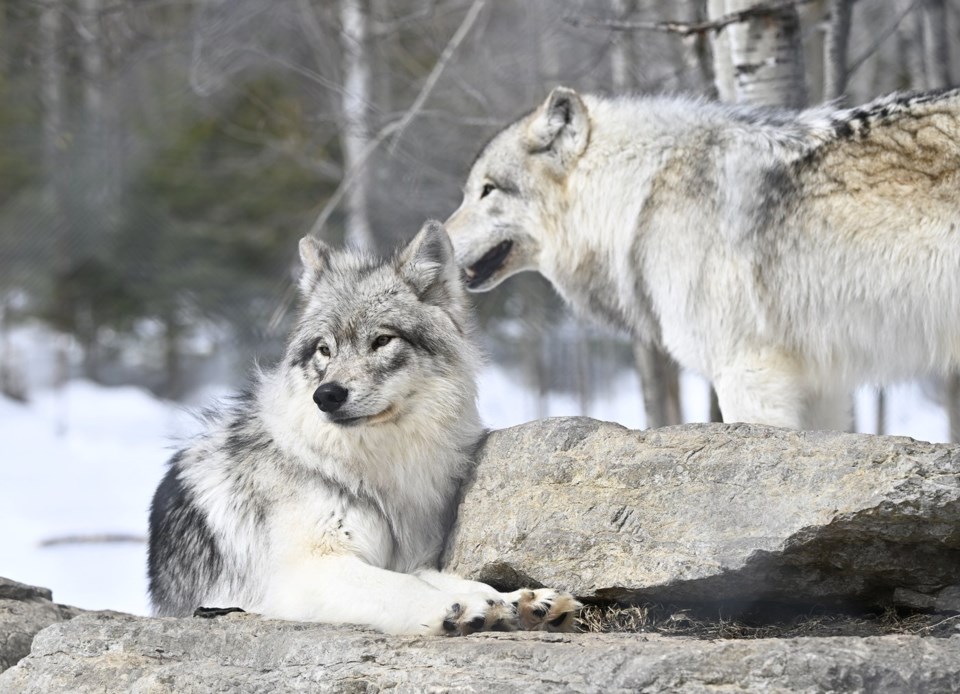The capture of 15 grey wolves in British Columbia and their release in Colorado is complete, an operation that led to unspecified threats against staff with Colorado Parks and Wildlife, the agency said in a statement.
The operation that began in B.C. on Jan. 10 and wrapped up on Saturday follows Colorado voters' approval of a 2020 ballot initiative to reintroduce grey wolves to the state, where the animals are listed as endangered.
But the program has stirred opposition, said a statement from Colorado Parks and Wildlife issued Sunday.
"Unfortunately, staff safety was threatened as (Parks and Wildlife) offices were watched and threatening social media posts and phone calls were received," it said.
The agency said it had not shared details while the wolf release was underway due to the "safety risk and security needs of our staff and the animals."
The ballot initiative to reintroduce grey wolves states the animals were historically "an essential part of the wild habitat" of Colorado, but they were "exterminated and have been functionally extinct for 75 years in the state."
Colorado Parks and Wildlife began the reintroduction process by releasing five wolves from Oregon in late 2023.
In its latest statement, the agency said two of the 10 wolves reintroduced to the state in 2023 have been illegally shot.
On Jan. 2, the U.S. Fish and Wildlife Service issued a statement offering a reward for information about the killing of a wolf late last summer. The animal had been captured in Oregon and released in Colorado.
In a statement last September, Jeff Davis, director of Colorado Parks and Wildlife, said the male wolf had been involved in "multiple depredations" of livestock.
The wolf was captured along with its mate and four pups and transferred to a secure enclosure, but the male was in poor condition and died a few days later.
A necropsy revealed that a gunshot wound led to its death.
The latest statement from Colorado Parks and Wildlife said the wolf's mate and four pups were successfully relocated on Jan. 18 after spending more than four months at a secure facility. Each animal was released with a tracking collar.
"Options in the case of the Copper Creek pack were very limited, and this action is by no means a precedent for how (Colorado Parks and Wildlife) will resolve wolf-livestock conflict moving forward," Davis said in Sunday's news release.
"Removing the male at that time, while he was the sole source of food and the female was denning, would likely have been fatal to the pups and counter to the restoration mandate," he said.
The six-day operation in B.C. this month involved the capture of seven male wolves and eight females from areas in the province's central Interior where "predator reduction" of threatened caribou populations occurs, the agency said.
Grey wolves are not considered threatened or endangered in B.C. and the province began culling the predators in 2015 in an effort to save caribou, a controversial program that involves shooting wolves from helicopters.
A team of biologists with Colorado Parks and Wildlife along with their counterparts from B.C.'s Ministry of Water, Land and Resource Stewardship gathered in Prince George ahead of the capture operation, the state agency's statement said.
The captured wolves were held in temporary pens filled with hay for bedding and ice blocks as a water source, it said. They were given treatments for parasites and vaccinated against rabies and other canine illnesses.
The wolves were then transported to Colorado by helicopter, with Parks and Wildlife staff on board to monitor their health throughout the flight.
The wolves were released on Jan. 12, 14 and 16 in Eagle and Pitkin counties.
Jan. 12 marks the 30th anniversary of wolves first being reintroduced from Canada to Yellowstone National Park, which spans parts of Wyoming, Montana, and Idaho," the statement from Colorado Parks added.
It said the wolves from B.C. received a "high level of veterinary care," but one wolf died following its capture.
An examination by veterinary staff found the animal's age and underlying condition may have contributed to its death, the agency said.
Colorado Wildlife biologists were "careful to select wolves that met the criteria identified at the outset of the (reintroduction) program," it said.
Animals with major injuries, such as missing eyes, fractured limbs or non-functional canine teeth were not selected, it said.
The wolves were captured in areas that do not overlap with livestock, a measure aimed at reducing the risk they will prey on farm animals in their new home.
The B.C. government consulted First Nations in the areas where wolves were identified for capture, the statement from Colorado Parks said, and three nations took part in the planning and operational phases for the project.
Colorado Parks and Wildlife was responsible for all of the costs associated with the capture and transport of the wolves, it said.
The agency said no further releases are planned for the 2024-2025 season, although the annual capture operation could continue for another one to three years.
This report by The Canadian Press was first published Jan. 21, 2025.
Brenna Owen, The Canadian Press



